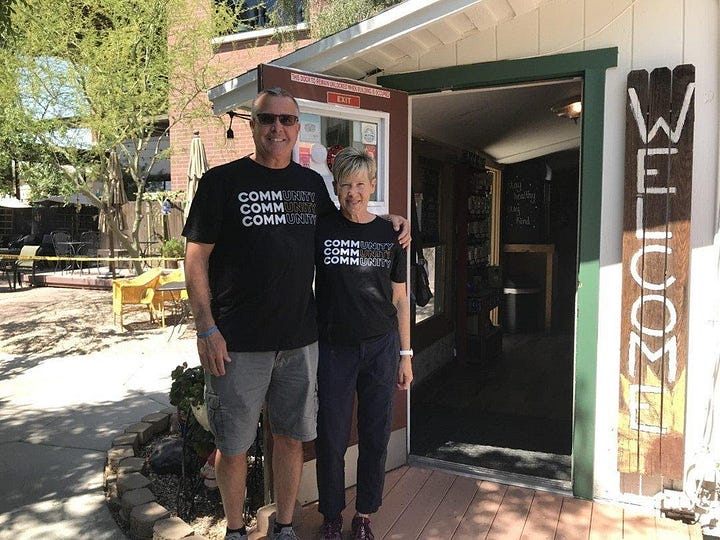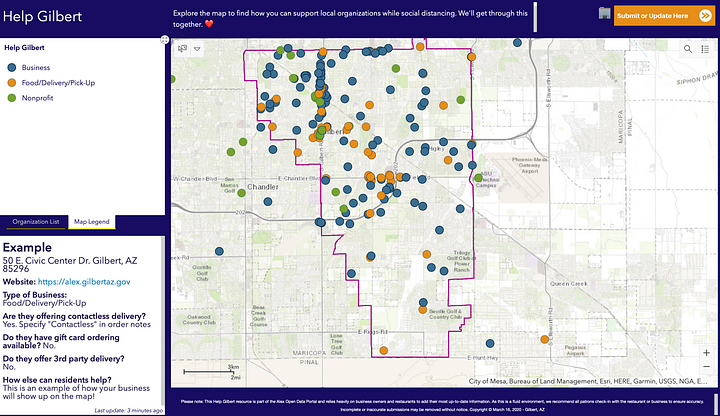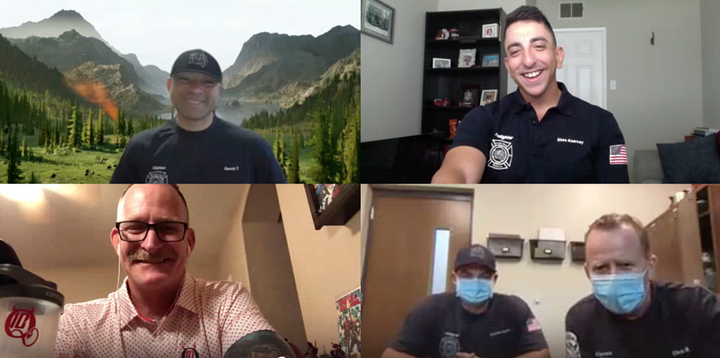Gilbert, Arizona, USA
Innovating On the Fly: Gilbert Embraces Change During COVID-19.
Project Type:
Community Engagement, Communications, Environment, Equity, Finance, High-Performing Government, Infrastructure
At a Glance
The open data portal increased community engagement by sharing up-to-date information on safety measures during COVID-19, growth and development for small businesses, transportation options, and conducting surveys about parks and recreation services.
Engaged the community to ensure that they stayed informed and up to date on community needs by utilizing the data received through surveys to drive decision-making for current and new programs.
Launched a business recovery program using feedback received from residents to support businesses through the COVID-19 pandemic. The program offered recovery grants, low-interest loans, and technical assistance programs to help both employers and potential employees.
How Open Data Helps Build Connections
aWhen the mayor of Gilbert, Arizona decided to hop into a DeLorean and belt out tunes “Carpool Karaoke”-style in a “Back to the Future”-themed YouTube video early last year, it was for more than just laughs. Gilbert officials were trying to get residents comfortable with receiving communications through the City’s social media channels.
In Gilbert, a sun-drenched city of more than 250,000 residents whose average age is 33, innovation, stakeholder engagement, and data-driven solutions have become top priorities. The pandemic underscored why. Whether helping small businesses survive or staff adjust to a new work-from-home normal, the City was able to quickly move into action. Its ability to do so in part stemmed from a strong data foundation built in recent years across Gilbert, located in the same “Valley of the Sun” as Phoenix. The City’s open data culture and infrastructure, as well as data governance and stakeholder engagement practices, were all in place prior to COVID-19. When the crisis hit, staff knew what data they had—as well as what quantitative and qualitative data they needed—to make effective decisions.
Its approach to distributing more than $9 million in hardship grants to local businesses struggling to survive the pandemic is a case in point. The City’s first step was to survey business owners to identify urgent needs and determine aid program priorities. With so many people shopping from home, business owners asked for funds to launch things like digital ordering systems and to obtain social media training.

“We used surveys to guide what kind of help would be best,” says Jennifer Graves, Gilbert’s deputy director of economic development. The responses ended up helping over 450 businesses in Gilbert receive grants allocated from federal CARES Act funds. Any member of the public could find out how those dollars were being spent; Gilbert demonstrated its commitment to transparency by launching a dashboard that tracked funding allocations to local businesses, nonprofits, and other categories.
Moreover, staff were able to leverage their open data training to quickly expand Gilbert’s robust Open Data Portal resources in ways that helped local businesses weather the crisis. In April 2020, just weeks after the COVID-19 lockdown began, Gilbert’s Office of Digital Government launched Help Gilbert. The crowdsourced portal allowed businesses to share information about their COVID-19 procedures and amended hours and services with residents via an interactive map showing what stores were open and how to support them. Nonprofits also began using the tool to recruit volunteers, and residents also contributed information to help each other find essential goods.

Launched as a feature of the City’s 311 app, the portal was in part successful because of many residents’ knowledge of the app, which involved crowdsourced local info and an interactive map. To build interest in the new mobile app in 2017, the City had engaged residents by creating a holiday lights map and inviting people to share photos showcasing their decorated homes. That encouraged downloads and familiarity with the tool, so there was less education needed when the pandemic hit and Help Gilbert quickly launched.
“That’s our strategy with communication-related tools: Engage people in fun ways so they learn something. When the important stuff comes up, they already have the knowledge and familiarity.”
Brave New WFH World
Like so many local businesses, Gilbert’s government had to transform operations during the lockdown. The City’s staff of about 1,600 had to learn how to work from home, for starters. Weeks after that shift occurred, Gilbert’s Office of Digital Government began evaluating how the new normal was going with the goal of helping employees adapt. In late April, it launched a survey to determine people’s frustration and needs across all departments. As with its approach to distributing hardship grants, the City took a data-first approach, gathering information from stakeholders to guide decisions.
One big pain point for many teams: People missed their office printers—they could no longer just print out public-facing materials, like fliers and catalogs. Berchman saw an opportunity to help departments make a lasting pivot to digital. Her team launched “innovation hours,” a drop-in virtual gathering where staff could come and discuss their struggles and triumphs as newly minted remote workers. Those sessions helped teams that didn’t do much printing to share their experiences, giving staff who had been hesitant to stop printing a chance to see another way.

Most notably, the Parks and Recreation office moved its catalog to a digital-first format. The shift ended up delighting staff, who could easily update classes and cancel events with the touch of a button. More importantly, it provided the City’s many young digital-savvy residents with content in a format they clearly prefer, Berchman says. It was time for city services to evolve.
The digital government team took another survey of staff last fall, drawing on results to determine whether and how staff should return to the office. Some, including the digital government team, may remain fully remote or work partly remote and partly in-person.
The key to success in all of Gilbert’s change efforts—whether involving technology, open data practices, or stakeholder engagement—has been the openness of leaders and department staff to experimentation and change. When the pandemic hit, this data-oriented culture was ready to meet the moment with the help of a data storyteller, a data content strategist, and a digital engagement coordinator on the team. In the coming years, as Gilbert embarks on a data-driven strategic planning process to prepare for its next 100 years, that culture will likely deepen.
“It’s been amazing to watch the City build its data foundation and normalize stakeholder- and data-driven decision-making in recent years,” says Berchman, who helped create the Office of Digital Government more than nine years ago.
“All of that work helped us get through the pandemic—and will surely help us respond to future challenges.”
“We wanted to gather data from people who were in the trenches. We wanted to ask people what they really thought before making an assumption.”